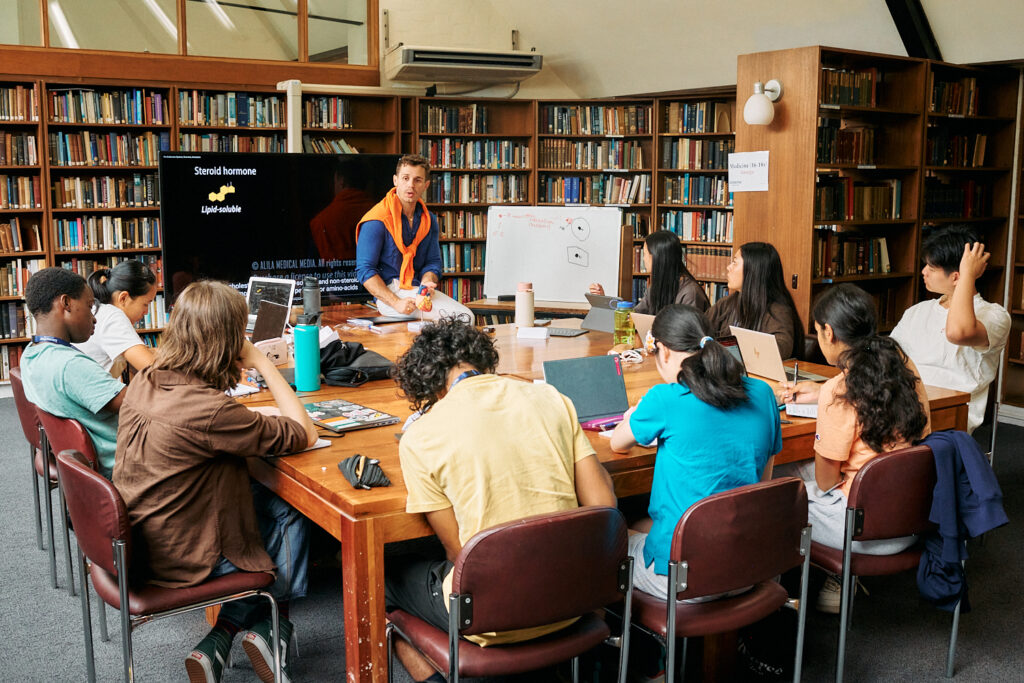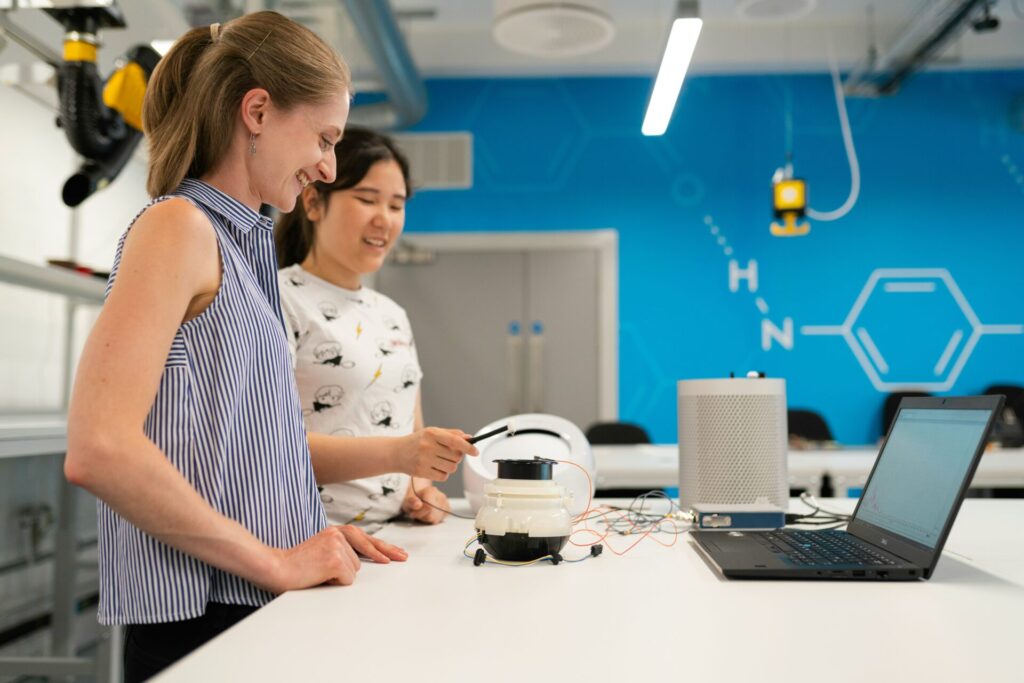Figuring out what A-Levels to take for computer science can be daunting. Knowing where to start is hard, and you don’t want to make the wrong decision that could ruin your future career prospects.
We’ve created this guide to help you figure out precisely what A-Levels you need to take to increase your chances of getting accepted for computer science at the university. With this information, you’ll be confident in choosing suitable subjects and get one step closer to achieving your goals.
What if you’re unsure if Computer Science is the course you want to pursue? Wouldn’t it be fantastic if you could have a taster before diving headlong into the real deal? Then you may want to check out our Computer Science Summer Courses.
What Is Computer Science?
Computer Science studies computers and computations. Major topics for Computer Science include:
- Algorithms
- Hardware & Software
- Computer systems
- Theory of Computing
- Database systems
- Numerical analysis
- Networks
- Security
- Artificial Intelligence
- Human-computer interaction
- Vision & Graphics
- Computer programming
Mathematics and engineering contribute to the foundation of computer science. So some of the mathematical and engineering techniques are also used in computer science, such as:
- Probability & Statistics
- Queueing theory
- Electronic circuit design
Is There an A-Level for Computer Science?
Yes, there is an A-Level for Computer Science. The usual topics covered for most A-Level Computer Science courses are:
- Computer Systems – examines how the Central Processing Unit (CPU) works. How do processors differ from each other? Computer systems discuss data types, data exchange, coding languages, and ethical concerns with privacy, sharing, and hacking.
- Algorithms and Programming – understand problems to determine how algorithms and programming can solve them. Applications of algorithms and programming can be applied to codebreaking, crime prevention, financial market management, and social networking.
- Data Structures – various ways to structure data, such as queues, files, and records.
- Big Data – refers to data that don’t fit containers. The greatest challenge with Big Data is its lack of structure. Making analysis difficult.
- Systematic Problem-Solving – solving problems follows a systematic workflow from analysis and design to testing and evaluation.
- Maths for Computer Science – tackle mathematical principles relevant to Computer Science, including number systems, sets, and mathematical functions.
- Software Engineering – how do you design a program and test it? Learning software engineering principles gives you a solid framework for developing software.
To learn more about the topics you can expect to learn from a university-level computer science programme with Immerse, download a syllabus overview.
Is GCSE Computer Science Needed for A-Level?
You don’t need GCSE computer science to take it at A-Level. However, it would be beneficial if you had, to give you better preparation. If you didn’t, the best thing to do is practice programming on your own. Why? Because A-Level computer science involves a good deal of programming. And if you have little to no prior learning, you’ll find the subject burdensome.
Mathematics plays a massive role in computer science. So you’ll need at least a B-grade to make it through. Have a grade lower than B? Perhaps it indicates that you don’t enjoy mathematics as much as other subjects. The extent to which you enjoy maths will also most likely be the degree to which you’ll enjoy computer science.
Why? Because both subjects are logic and problem-solving-based. It’s about using computation to get to the solution.
Computer Science A-Level Requirements
What are the requirements for A-Level computer science? Schools often require a particular GCSE grade for English and Mathematics. Here are actual examples:
- Hereford Sixth Form College – Grade 5/B in GCSE Mathematics, Grade 4 in English
- High Pavement Sixth Form of Nottingham College – Grade 6 (B) or above in Mathematics, Grade 4 (C) or above in English
- David Game College – Mathematics and English at 9-4 (A*-C)
Is Computer Science a Hard A-Level?
The difficulty of A-Level computer science depends on the student’s capacity. Do you excel at and enjoy maths? Then you’ll most probably find computer science fun and manageable. But if you can hardly sit through a maths lecture without getting bored, you may feel that computer science is too complicated.
To help you gauge how difficult A-Level computer science is, let’s compare its results with other subjects. According to Ofqual Analytics’ A-Level Outcomes in England, the percentage of students who received A* and A in 2024 for Computer Science, Mathematics, and Physics are:
| Subject | A* | A |
| Computer Science | 5.7% | 23.8% |
| Mathematics | 16.7% | 41.5% |
| Physics | 11.2% | 31.5% |
The data shows that more students achieved A*s and As in mathematics and physics than in computer science. Showing that computer science may be a more difficult subject than mathematics and physics.
What A-Levels Do You Need for a Computer Science Degree?
Most universities require A-Levels in mathematics and/or computer science. Here are concrete examples from top computer science schools in the UK.
Examples of Computer Science Degree Requirements From Top-Performing Schools
- University of Oxford – A*AA with A* in A* in Mathematics, Further Mathematics or Computer Science.
- University of Cambridge – A*A*A (From 2017-2019, 81% of the freshmen achieved at least A*A*A*. They all took Mathematics, 96% Further Mathematics, 85% Physics, and 59% Computer Science.
- Imperial College London – A*A*A with A* in Mathematics, A*, A in two more subjects. The 3 most recommended subjects are Computer Science, Further Maths, and Physics. Here’s a list of subjects that are not accepted: Business Studies, Critical Thinking, General Studies, and Information and Communications Technology (ICT).
- University of St. Andrews – AAA, with A in Mathematics. The two other subjects must include any of the following: Computing Science, Further Mathematics, Chemistry, Biology, Geography, Geology, Physics, and Psychology.
- King’s College London – A*A*A with A in Mathematics or Further Mathematics. An A-Level in Computer Science is recommended. The following subjects are not accepted by King’s: Critical Thinking, General Studies, and Thinking Skills and Global Perspectives.
Join the Immerse Education 2025 Essay Competition
Follow the instructions to write and submit your best essay for a chance to be awarded a 100% scholarship.

Which Subjects Combine Well With Computer Science (A-Level)?
The A-Level subjects you take determine which university courses will be available to you. By extension, it’ll open up specific computer science career options while closing down others. So it’s best to look ahead when deciding which A-Levels to study.
A good practice for deciding quality A-Level combinations is to pinpoint:
- Subjects you enjoy
- What you excel at
- Career goals
- Top 3 university choices
- Overlapping subjects (because universities don’t favour them)
What are overlapping subjects? These are A-Level subjects that are too close to each other, such as Economics and Business Studies.
Suppose you want to take computer science at university. In that case, the usual A-Level combination is maths/further maths, physics, and computer science.
What University Courses Are Best for A-Level Computer Science?
What are the relevant university courses for an A-Level in Computer Science?
- Computer Science
- Software Engineering
- Computer Games Design and Programming
You now know that the two most essential A-Level subjects for computer science are computer science and mathematics. Do you want to know what computer science is like at the university level? Don’t miss out on the opportunity to learn from Cambridge, Oxford, or Ivy League Tutors! Take a look at our computer science Summer Courses.




















